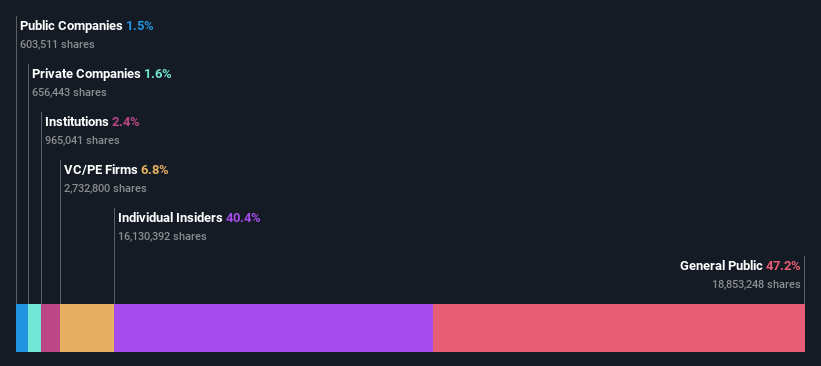Lycopodium Limited (ASX:LYL) most popular amongst retail investors who own 47%, insiders hold 40%
Key Insights
Lycopodium's significant retail investors ownership suggests that the key decisions are influenced by shareholders from the larger public
A total of 12 investors have a majority stake in the company with 50% ownership
If you want to know who really controls Lycopodium Limited (ASX:LYL), then you'll have to look at the makeup of its share registry. And the group that holds the biggest piece of the pie are retail investors with 47% ownership. Put another way, the group faces the maximum upside potential (or downside risk).
And individual insiders on the other hand have a 40% ownership in the company. Institutions often own shares in more established companies, while it's not unusual to see insiders own a fair bit of smaller companies.
Let's delve deeper into each type of owner of Lycopodium, beginning with the chart below.
See our latest analysis for Lycopodium
What Does The Institutional Ownership Tell Us About Lycopodium?
Many institutions measure their performance against an index that approximates the local market. So they usually pay more attention to companies that are included in major indices.
Less than 5% of Lycopodium is held by institutional investors. This suggests that some funds have the company in their sights, but many have not yet bought shares in it. So if the company itself can improve over time, we may well see more institutional buyers in the future. We sometimes see a rising share price when a few big institutions want to buy a certain stock at the same time. The history of earnings and revenue, which you can see below, could be helpful in considering if more institutional investors will want the stock. Of course, there are plenty of other factors to consider, too.
Lycopodium is not owned by hedge funds. Michael Caratti is currently the company's largest shareholder with 23% of shares outstanding. With 7.5% and 6.8% of the shares outstanding respectively, Bruno Ruggiero and Thorney Investment Group Australia Pty. Ltd. are the second and third largest shareholders. Bruno Ruggiero, who is the second-largest shareholder, also happens to hold the title of Senior Key Executive. In addition, we found that Peter De Leo, the CEO has 2.3% of the shares allocated to their name.
After doing some more digging, we found that the top 12 have the combined ownership of 50% in the company, suggesting that no single shareholder has significant control over the company.
Researching institutional ownership is a good way to gauge and filter a stock's expected performance. The same can be achieved by studying analyst sentiments. As far as we can tell there isn't analyst coverage of the company, so it is probably flying under the radar.
Insider Ownership Of Lycopodium
The definition of company insiders can be subjective and does vary between jurisdictions. Our data reflects individual insiders, capturing board members at the very least. Company management run the business, but the CEO will answer to the board, even if he or she is a member of it.
I generally consider insider ownership to be a good thing. However, on some occasions it makes it more difficult for other shareholders to hold the board accountable for decisions.
Our most recent data indicates that insiders own a reasonable proportion of Lycopodium Limited. Insiders own AU$123m worth of shares in the AU$304m company. We would say this shows alignment with shareholders, but it is worth noting that the company is still quite small; some insiders may have founded the business. You can click here to see if those insiders have been buying or selling.
General Public Ownership
With a 47% ownership, the general public, mostly comprising of individual investors, have some degree of sway over Lycopodium. This size of ownership, while considerable, may not be enough to change company policy if the decision is not in sync with other large shareholders.
Private Equity Ownership
With an ownership of 6.8%, private equity firms are in a position to play a role in shaping corporate strategy with a focus on value creation. Sometimes we see private equity stick around for the long term, but generally speaking they have a shorter investment horizon and -- as the name suggests -- don't invest in public companies much. After some time they may look to sell and redeploy capital elsewhere.
Next Steps:
I find it very interesting to look at who exactly owns a company. But to truly gain insight, we need to consider other information, too. Take risks for example - Lycopodium has 2 warning signs we think you should be aware of.
Of course this may not be the best stock to buy. So take a peek at this free free list of interesting companies.
NB: Figures in this article are calculated using data from the last twelve months, which refer to the 12-month period ending on the last date of the month the financial statement is dated. This may not be consistent with full year annual report figures.
Have feedback on this article? Concerned about the content? Get in touch with us directly. Alternatively, email editorial-team (at) simplywallst.com.
This article by Simply Wall St is general in nature. We provide commentary based on historical data and analyst forecasts only using an unbiased methodology and our articles are not intended to be financial advice. It does not constitute a recommendation to buy or sell any stock, and does not take account of your objectives, or your financial situation. We aim to bring you long-term focused analysis driven by fundamental data. Note that our analysis may not factor in the latest price-sensitive company announcements or qualitative material. Simply Wall St has no position in any stocks mentioned.
Join A Paid User Research Session
You’ll receive a US$30 Amazon Gift card for 1 hour of your time while helping us build better investing tools for the individual investors like yourself. Sign up here

 Yahoo Finance
Yahoo Finance 

